Foundation problems can seriously affect your home’s value. Cracks, uneven floors, and sticking doors might point to deeper issues. These warning signs can make selling or investing in your home much harder.
Foundation issues often scare buyers and lower offers. Banks may refuse loans for homes with obvious damage. Repairs can be costly and stressful, causing worry for everyone involved.
Foundation problems can reduce your home’s value and make it harder to sell. Fixing these issues before selling is the best move.
A solid foundation brings peace of mind and better value. This blog will guide you through understanding and addressing foundation problems to protect your home’s worth.
Key Takeaways
- Foundation problems typically lower a home’s market value by 10–20%, depending on severity and repair costs.
- Visible cracks and uneven floors deter buyers, reducing marketability and leading to lower offers.
- Foundation issues often complicate loan approvals and insurance, making sales more difficult or causing deal cancellations.
- Unresolved foundation problems shift negotiation power to buyers, who may demand repairs, credits, or significant price reductions.
- Prompt professional repairs and documentation can help restore buyer confidence and minimize negative impacts on value.
Common Signs of Foundation Problems
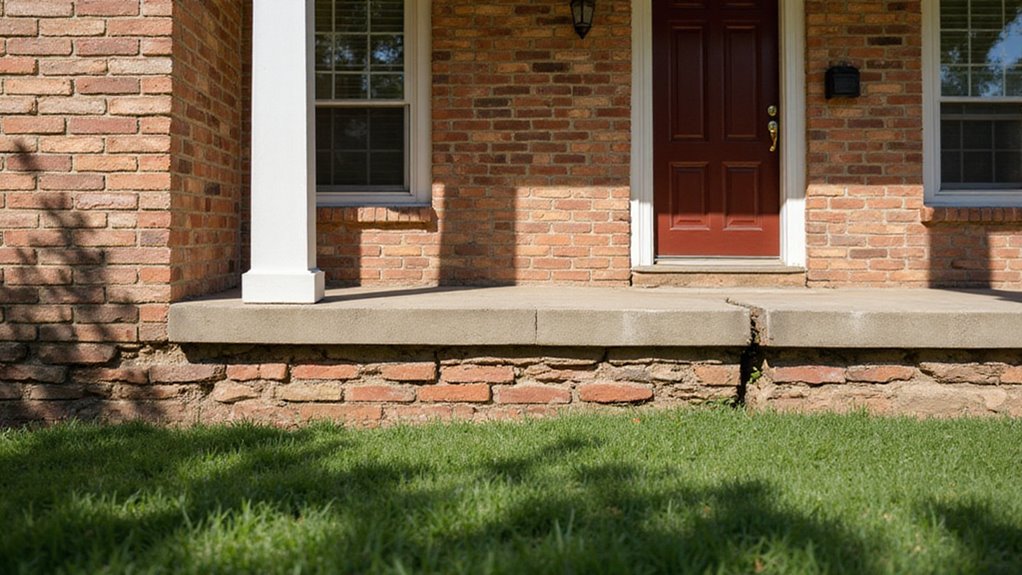
You can spot foundation problems by looking for certain signs in your home. Cracks in walls or floors are important clues. Strange gaps or shifting surfaces may also indicate trouble.
Diagonal or stair-step cracks are more serious than straight cracks. If you notice doors or windows that suddenly stick, this could mean your foundation is moving. Floors that slope or feel uneven are other warning signs. If you notice these issues, proper asset allocation can also come into play when determining how repairs may affect the value of your home.
Gaps between walls and ceilings may show ongoing stress. Bricks separating on the outside of your house can signal foundation damage. If you see these symptoms, you should investigate further to prevent bigger problems. Just like property type and condition can affect how quickly homes sell in Virginia, the condition of your foundation plays a significant role in your home’s market value and buyer appeal.
Causes of Foundation Damage
Foundation damage usually happens when the ground beneath your house changes. Soil movement is the main cause. If you notice cracks or uneven floors, the soil might be shifting.
Clay soils are more likely to expand and shrink with moisture. This can make the foundation uneven. Structural settling also happens as your house presses down on the soil over time. When assessing damage, it’s important to check for property liens since unresolved liens may affect your ability to sell if repairs are needed.
If there are plumbing leaks, water may weaken the soil. Poor drainage can also lead to foundation problems. Tree roots growing near the house may push against the foundation.
If you spot these issues early, you can fix them before they get worse. Quick action could help you avoid expensive repairs. Proper maintenance often prevents serious damage.
When buying or selling a house, disclosure requirements are important if foundation issues are present, as failing to inform buyers about structural damage can lead to legal trouble.
How Appraisers Evaluate Foundation Issues
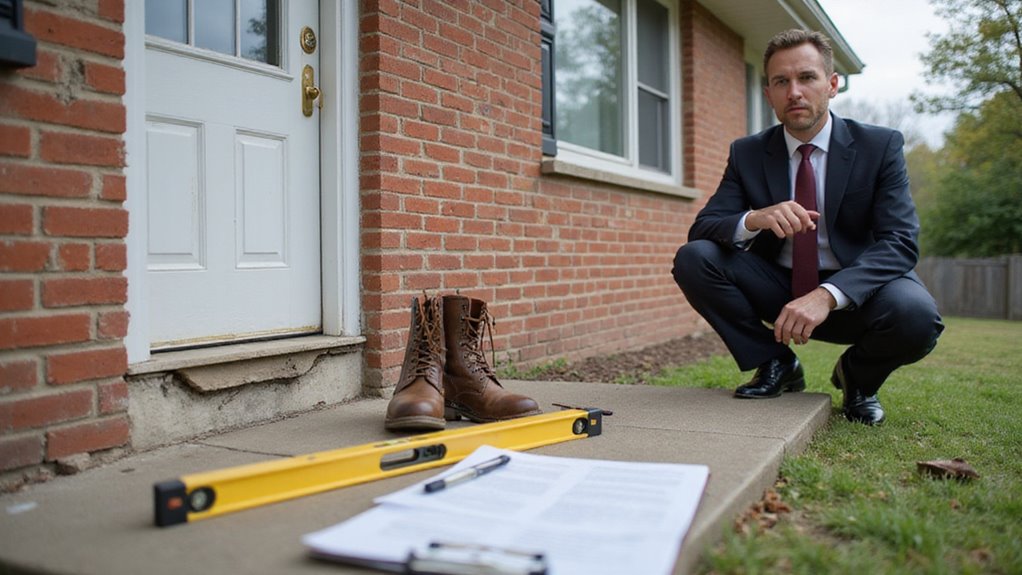
Appraisers check for foundation problems by looking for more than just cracks or cosmetic damage. They focus on signs like uneven floors, sticking doors, and shifting walls. Their goal is to see if the foundation is doing its job.
Appraisers also look for water leaks, check crawl spaces, and review previous repairs or reports. If you have professional inspection records, you should give them to the appraiser. These documents can help them understand any past issues. In cases where expired listings are involved, appraisers may also take into account market perception because prior buyer hesitation may impact the effective value.
Their evaluation is careful and based on clear observations. Appraisers want to know if the foundation problems affect the home’s safety and stability. If they find serious issues, it could impact the home’s value. In Virginia, appraisers also consider whether proper documentation is available, as thorough records like deeds, repair histories, and inspection reports help ensure accurate assessments and legal compliance.
Impact on Market Value
Foundation issues can lower your home’s market value. Appraisers usually reduce the value if they find serious foundation problems. The cost and extent of repairs are important factors in this decision. Market trends and property condition also play a key role in how much foundation problems will impact the sale price.
If repairs are expensive or complicated, your home will be worth less than others without these issues. Buyers often avoid homes that need major foundation work. Ongoing problems can scare away competitive offers.
Fixing the foundation is important for both safety and value. Addressing these issues can help protect your investment. If you repair the foundation, you may improve your home’s market position.
In some cases, buyers will expect a bigger price discount to offset the risks and costs associated with foundation repairs.
Buyer Perceptions and Concerns
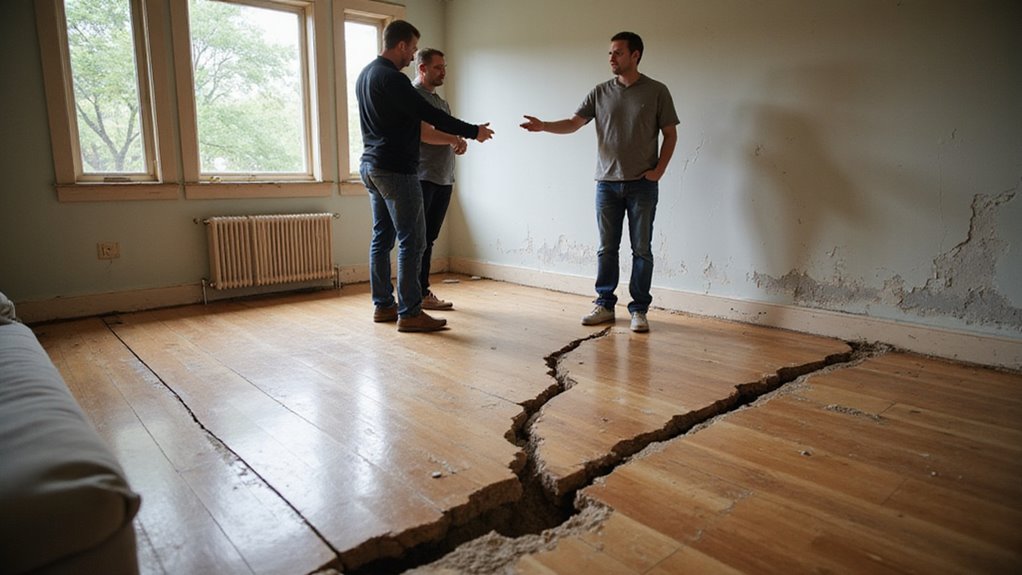
When buyers spot foundation issues, you’ll find their trust in the home’s safety drops sharply. This skepticism often makes them more cautious and less willing to meet your asking price. As a result, you’re likely to enter negotiations from a weaker position, with buyers demanding concessions or repairs.
Many buyers will also compare your property to recently sold homes without foundation concerns, making competitive pricing even more crucial for attracting serious interest. If you’re selling in Waynesboro, VA, you should also consider that a property’s condition can influence whether buyers will require costly repairs or prefer an as-is cash offer.
Trust in Home Safety
Trust in home safety depends on how secure and well-maintained a house appears. Buyers often check for foundation problems before deciding to buy. Any visible cracks or damage can quickly raise doubts.
Visible foundation cracks lower a buyer’s trust in the home’s safety. A recent and detailed home inspection increases buyer confidence. Lack of maintenance records can make buyers worry about future problems.
If you show proof of foundation care and a clean inspection report, buyers will feel more secure. This can directly affect their decision to make an offer. Clear evidence of safety can make your home stand out.
Willingness to Negotiate
Buyers usually want to negotiate if they notice foundation issues. Even if repairs are done, most buyers still see a risk. They may worry about future problems or resale value.
Foundation warranties help, but some buyers stay cautious. If you have soil stabilization records, share them. These records can ease concerns but may not remove all doubts.
Most buyers will expect a lower price or extra benefits to cover possible costs. If you are open to negotiation, you are more likely to sell. Always give clear and honest repair records to build trust.
The Cost of Foundation Repairs
When you’re facing foundation issues, you need to understand that repair costs can range from a few thousand dollars to well over ten thousand, depending on the severity and type of damage. Factors like your home’s age, soil conditions, and the chosen repair method all play a role in the final bill.
In some cases, choosing professional repairs through trusted local buyers can help homeowners in Elkton avoid hidden costs and stress during the transaction process. While DIY fixes might seem tempting, professional repairs typically offer greater long-term value and reliability. Sellers in Virginia should also be aware that structural damage from water and mold requires prompt assessment and repair to maintain the home’s safety and value.
Average Repair Price Range
Foundation repair costs usually range from $2,000 to $7,500 for most homeowners. Prices depend on the damage and repair type. Severe issues can cost much more.
Minor cracks or small repairs might cost $500 to $2,000. Moderate settlement repairs usually fall between $2,000 and $7,500. Major structural repairs can range from $7,500 to $15,000.
If your home has severe foundation or soil stability problems, repairs may cost $15,000 or more. Knowing these ranges can help with budgeting. Early repairs may prevent higher expenses in the future.
Factors Influencing Repair Costs
Several important factors affect how much foundation repair will cost. The main one is how much damage your foundation has. Small cracks are cheaper to fix than major structural problems.
The foundation type, like slab, crawl space, or basement, changes the work and materials needed. Certain types may cost more to repair. If your home sits on soil that moves or shifts, repairs can get more complicated and expensive.
Advanced repairs need special equipment and expert help, which raises the price. Hard-to-reach areas increase labor costs if workers have to dig more. Local rules and permits may add extra costs to your bill. If you know these factors, you can better estimate how much money you might need to protect your home.
Comparing DIY vs. Professional
Choosing between DIY and professional repairs changes both your budget and the final result. DIY repairs are cheaper at first, but may carry hidden risks. Professional repairs cost more but often guarantee quality.
DIY can save money if you have the right skills and tools. If you make mistakes, you could cause more damage. Improper work may lower your home’s value.
Hiring a professional costs more but brings experience and reliability. Professionals usually provide warranties and thorough inspections. If you plan to sell, professional work can reassure buyers.
If you are unsure of your skills, it is safer to call a professional. Consider the risks and long-term costs of each option. Your decision can affect your home’s value in the future.
Insurance Implications
Insurance can help protect your home if you have structural problems. Most standard policies do not cover foundation issues caused by normal settling or poor maintenance. They may cover sudden damage from events like burst pipes or certain disasters. If major repairs are needed for a sale, working with no repairs required specialists can help you sell the house as-is without additional out-of-pocket costs.
You should read your policy to know what is covered. If you find damage, take clear photos and contact your insurance company right away. The insurer may send an adjuster or ask for expert reports.
Understanding what your policy excludes lets you plan for repair costs. If you are unsure, ask your insurer for details. Being prepared helps you avoid unexpected expenses. When dealing with insurance challenges, coverage gaps and higher premiums may arise with properties that have extensive issues, so it’s wise to address known problems and clarify your coverage options.
Selling a Home With Foundation Problems
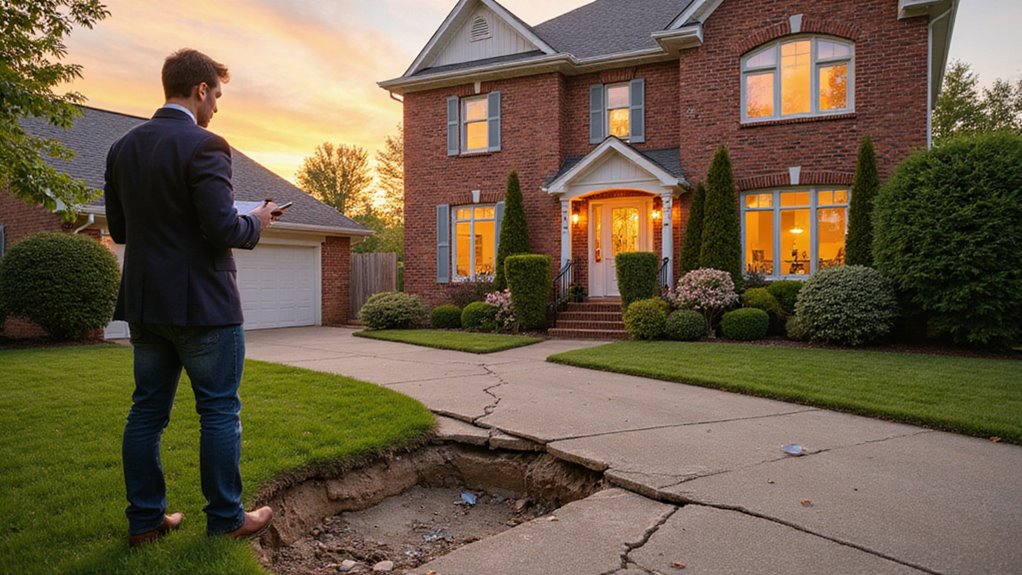
When you’re selling a home with foundation problems, you must follow strict disclosure requirements to avoid legal complications. Buyers will factor these issues into their offers, which typically means you’ll see a lower sale price.
Understanding your obligations and the market’s response helps you set realistic expectations. Sellers in Virginia should understand that providing repair estimates and transparency during negotiations can help build buyer confidence and potentially streamline the selling process.
Disclosure Requirements for Sellers
Sellers must tell buyers about any known foundation problems before selling a home. The law requires you to share details about structural issues. Hiding problems can lead to legal trouble.
If you do not disclose foundation issues, you risk lawsuits and financial loss. Buyers may walk away if they fear hidden costs. Honest disclosures can build trust and speed up the sale.
Ethical selling protects both you and the buyer. If you are unsure whether to disclose something, you should always choose to be transparent. Full disclosure helps prevent last-minute problems and keeps the process smooth.
Impact on Sale Price
Foundation problems can lower your home’s sale price. Buyers worry about repair costs and future risks. Many will offer much less or lose interest.
If a foundation issue is found, lenders may refuse loans or limit financing. Insurance companies might not provide coverage. These factors make it harder to sell your house.
Homes with unresolved foundation problems can lose 10% to 20% of their value. Selling quickly or at a fair price becomes difficult. If you fix the foundation early, you can protect your investment.
Negotiating Price Reductions
You can use foundation problems to negotiate a lower price on a home. If you find structural issues, you have more power to ask for concessions. Focus on repair costs and do not let emotions affect your decision.
Professional repair estimates can help you ask for a significant price reduction. If the seller agrees, you could save money upfront. You should always base your request on verified numbers.
You may also request a foundation warranty from the seller. This warranty could protect you if new problems arise later. If the seller refuses, you should factor that risk into your offer.
Another option is to ask the seller to pay for repairs through financing. If the seller covers these costs, your budget will be safer. This could make the purchase more manageable for you.
You can point out similar homes with the same issues during negotiations. If other homes sold for less due to foundation problems, use that as evidence. This approach can support your request for a better deal.
Disclosure Requirements for Sellers
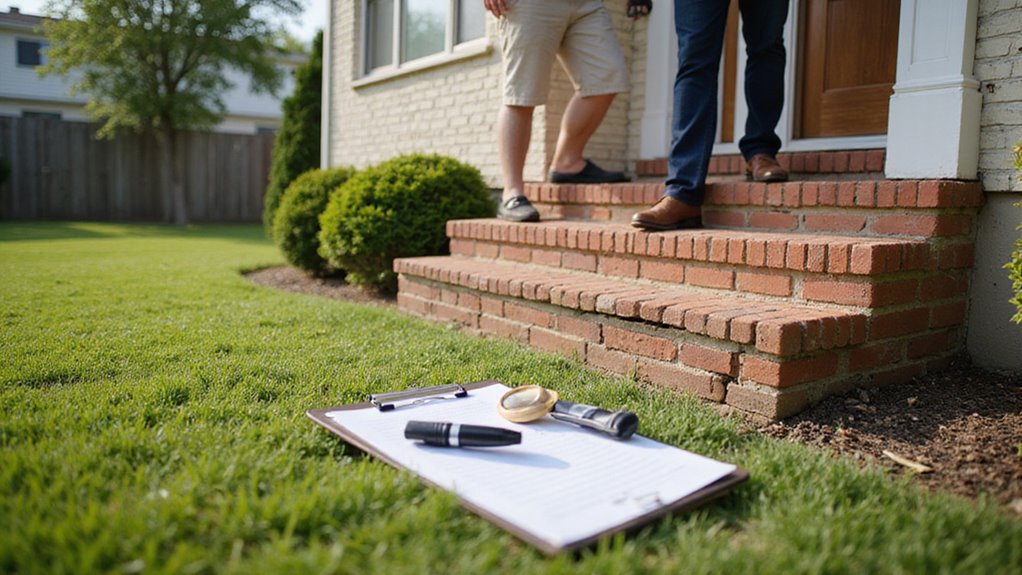
Most states require home sellers to tell buyers about known foundation problems. Sellers must share information about issues like settlement or soil stability. This rule helps protect both buyers and sellers.
If you hide these problems, you could face lawsuits or lose the sale. Buyers want to know about the home’s structure before they buy. Full honesty helps build trust during the sale.
Before selling, check your state’s disclosure laws. A professional inspection can help you find any foundation issues. This ensures you meet legal requirements when selling your home.
Financing Challenges for Buyers
Foundation problems often make it hard to get a home loan. Lenders see these issues as high-risk and may hesitate to approve financing. Even small cracks in the foundation can be a serious concern for banks.
Lenders consider foundation issues high-risk, making it tough to secure a mortgage—even minor cracks can raise major concerns.
If you apply for a mortgage on a home with foundation damage, you might face several problems. Some lenders could deny your application altogether. Others may only approve your loan if you agree to costly repairs.
Higher interest rates are another possible outcome if the lender does approve your loan. This means you will pay more over time. If your financing falls through, you might also lose your earnest money.
Foundation issues do not just affect the house. They can also make buying the home more stressful and expensive. If you want to buy a house with these problems, be prepared for extra steps and expenses.
Effect on Home Inspections
During a home inspection, foundation issues instantly raise red flags that inspectors can’t overlook. You’ll notice that these problems often shift negotiation advantage, giving buyers more power to demand repairs or price reductions. Understanding this dynamic is crucial as it directly impacts your position in the transaction.
Inspection Red Flags Raised
If an inspection finds foundation issues, it raises serious concerns for buyers and agents. These problems can affect the sale of your home right away. Most buyers will be cautious if there are questions about the foundation.
A missing or invalid foundation certification makes things worse. Lenders may refuse loans if the home’s structure is in doubt. Buyers might worry about future costs and repairs.
An inspector’s report that lists foundation problems often leads to more inspection requests. You may need to pay for extra reports from engineers. If these issues are not fixed, buyers might lower their offers or back out completely.
Addressing foundation issues quickly is important if you want to sell your home smoothly. If you ignore these problems, the selling process can become difficult. Fixing the foundation can restore buyer confidence and help your sale move forward.
Negotiation Leverage Shift
When foundation problems show up in an inspection report, buyers gain much more negotiation power. Sellers may need to offer repairs, price cuts, or credits. Foundation issues are serious and expensive, so buyers can ask for better terms.
Buyers should use these findings to protect their investment. An inspection report can justify requests for repairs or lower prices. If needed, a specialist can give a second opinion.
Sellers often lose negotiating strength when foundation issues are discovered. If a seller wants to keep the deal, they might agree to buyer requests. These problems can change the entire negotiation process.
Preventive Measures to Protect Value
Foundation problems can lower your home’s value. Taking preventive steps helps protect your investment. You should act early to avoid bigger issues.
Annual inspections can catch small problems before they grow. Good drainage and grading keep water away from your foundation. Address any drainage issues as soon as you find them.
Foundation waterproofing blocks moisture from entering. Soil stabilization can help if your home is on loose or shifting soil. If you notice cracks or uneven floors, seek professional advice. Taking action now keeps your property safe and valuable.
When to Call a Foundation Specialist
Call a foundation specialist if you see cracks in walls, uneven floors, or doors that do not close properly. These can be signs of serious problems with your home’s foundation. If you wait too long, the damage could get worse and repairs may cost more.
A professional will check the cause of the problem, such as soil movement or poor drainage. Their knowledge helps fix the real issues, not just surface damage. If you act quickly, you can protect your home’s value and avoid bigger repairs later.
If you notice any warning signs, contact a specialist right away. Early action is the best way to keep your home safe. This will also give you peace of mind.
Conclusion
Foundation problems can significantly reduce your home’s value. If you address these issues early, you can prevent bigger losses. Proper repairs and documentation help keep your home attractive to buyers.
If you need to sell quickly, we buy houses for cash, even with foundation issues. Align Real Estate Solutions offers a straightforward process and fair prices. You can avoid stressful negotiations and repairs.
If you want to protect your investment and move forward, reach out to us. We are ready to help you sell your home fast. Let Align Real Estate Solutions guide you to a smooth, successful sale.
Author
-

Zach Koops is co-founder and Real Estate Success Manager at Align Real Estate Solutions, serving homeowners across Virginia since 2024. With a passion for real estate and a heart for people, Zach has built his career around helping sellers navigate tough situations—foreclosure, inheritance, relocation, repair-overload—with clarity and compassion. He’s known for being straightforward, steady under pressure, and deeply invested in relationships. Outside of work, he spends his time as a husband and father, enjoys the outdoors in Shenandoah Valley, loves singing on stage, and constantly seeks growth through reading and new experiences.









